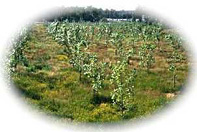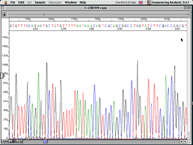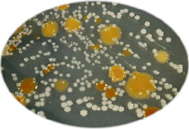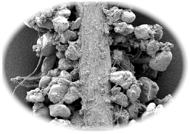|
|
 Rhizosphere Engineering Rhizosphere Engineering

PROJECT START DATE: August 1, 2000
OBJECTIVES:
To increase the knowledge and predictability in assessing the spectrum of soil microbial community structure and  function related to soil “health” and “quality”, as well as developing the molecular biological tools and strategies for monitoring and prediction. function related to soil “health” and “quality”, as well as developing the molecular biological tools and strategies for monitoring and prediction.
BACKGROUND/INTRODUCTION:
Environmental microbiology represents a growing focus of microbiology, contributing to agriculture (e.g.,  traditional agriculture, plant growth promotion, plant protection, bio-pesticides, etc.), environmental protection (e.g., communal waste treatment and bio-remediation of pollutants) and environmental monitoring (e.g., applications of biosensors). The principal goal, and problem, in environmental microbiology is to obtain
a reliable analysis and understanding of microbial function in situ. In contrast to traditional “laboratory” microbiology in controlled and homogenous systems, environmental applications generally involve complex and heterogeneous systems, wherein functional activities are difficult to monitor and more difficult to predict and traditional agriculture, plant growth promotion, plant protection, bio-pesticides, etc.), environmental protection (e.g., communal waste treatment and bio-remediation of pollutants) and environmental monitoring (e.g., applications of biosensors). The principal goal, and problem, in environmental microbiology is to obtain
a reliable analysis and understanding of microbial function in situ. In contrast to traditional “laboratory” microbiology in controlled and homogenous systems, environmental applications generally involve complex and heterogeneous systems, wherein functional activities are difficult to monitor and more difficult to predict and  control. In such cases, microbial function is governed by the
ecological parameters of the particular environment in which the activities are being carried out. Currently, many ecological parameters, particularly in soil environments, determining microbial metabolic activities are unknown. control. In such cases, microbial function is governed by the
ecological parameters of the particular environment in which the activities are being carried out. Currently, many ecological parameters, particularly in soil environments, determining microbial metabolic activities are unknown.
CURRENT RESEARCH:
The topics of research are focussed on three themes:
 Soil bio-diversity and conservation: Soil bio-diversity and conservation:
- Importance of soil bio-diversity for soil "health" and "quality";
- The role of soil bio-diversity for maintaining soil "health" and "quality".
- Soil ecosystem function:
- The key metabolic functions for maintaining soil "health" and "quality";
- The roles soils play in maintaining ecosystem functions.
- Soil indicators:
- The key components of soil bio-diversity correlated with soil "health" and "quality";
- The practical considerations in applying microbial soil indicators.
Projects
- "Endophytic degrader bacteria for improving phytoremediation of organic xenobiotics (ENDEGRADE)". EU Quality of Life and Management of Living Resources Programme, 5th Framework.
http://www.dmu.dk/1_viden/2_Miljoe-tilstand/3_jord/4_endegrade/
- "International Double Blind Study for the Identification of Pseudomonas species". Funded by the Biotechnology Section of the Health Canada Agency.
- "In Situ Bioremediation of Soil Contaminated with Chlorinated Ethenes and Nickel: Demonstration of Cleanup by Anaerobic Bacteria (ChloRem)". EU Demonstration Pro-gramme, 4th Framework.
|